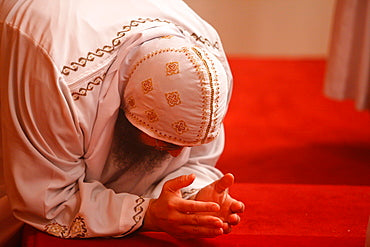Blessed are those who mourn for they shall be comforted (Matt 5:4)
Compunction (or in Greek panthos, means sadness or mourning) repeatedly appears in the monastic literature. Many monastic fathers even advised it as a way of life. Abba Poemen once saw a woman grieving over her husbands’ tomb, he said “if all the delights of the world were to come they could not drive sorrow away from the soul of this woman. Likewise the monk should have compunction in himself.”
There are many causes to compunction. It could be a result of a loss of a relative or a friend or sadness over a mishap in life. But this was not the cause that the fathers were referring to when they advised the use of compunction. Once a monk got news of the death of his father, “stop blaspheming” he replied “my father is immortal.” St Macarius is also said to have helped a robber who was raiding his cell.
It is this negative aspect of sadness that Evagrius warns us about and which he includes in his list of eight thoughts that attack a monk. He clearly says that “a monk afflicted by sadness knows no spiritual pleasure.” It is very clear then that the sadness or mourning that we experience in our everyday life is not the kind that the fathers advocate because if it was the case, monks would have been the most depressed of all people, which is contrary to the truth.
In the Christian point of view the one thing that a Christian should be sad about is his sins that endanger his salvation. As Orthodox Christians we understand that salvation is a work in progress throughout our lives until our last breath. But again we must not imagine that the desert fathers lived their lives unsure of God’s mercy and his free salvation, but what they were not sure of is themselves, whether they can hold onto this free gift.
“A brother said to abba Poemen, ‘if I fall into a shameful sin, my consciences devours and accuses me saying ‘why have you fallen?’ the old man said to him, ‘at the moment when a man goes astray, if he says, ‘I have sinned, immediately the sin ceases.”
St John Climacus in his book “the ladder of divine ascent” explains in his 7th step the Christian kind of sadness, calling it “Joy-making mourning.” He says “he who wends his way in constant mourning according to God does not cease to feast daily.” St John expresses his assurance of this joy that follows the mourning yet he cannot put it into words
“ when I consider the actual nature of compunction, I am amazed at how that which called mourning and grief should contain joy and gladness interwoven within it like honey in the comb… such a compunction is a gift of God, for God consoles those who are contrite in heart in a secret way.”
The paradox of joy and mourning has confused the desert fathers and is still confusing us till today, yet what the fathers were holding unto was the promise of the Bible that says “Blessed are those who mourn for they shall be comforted.”


